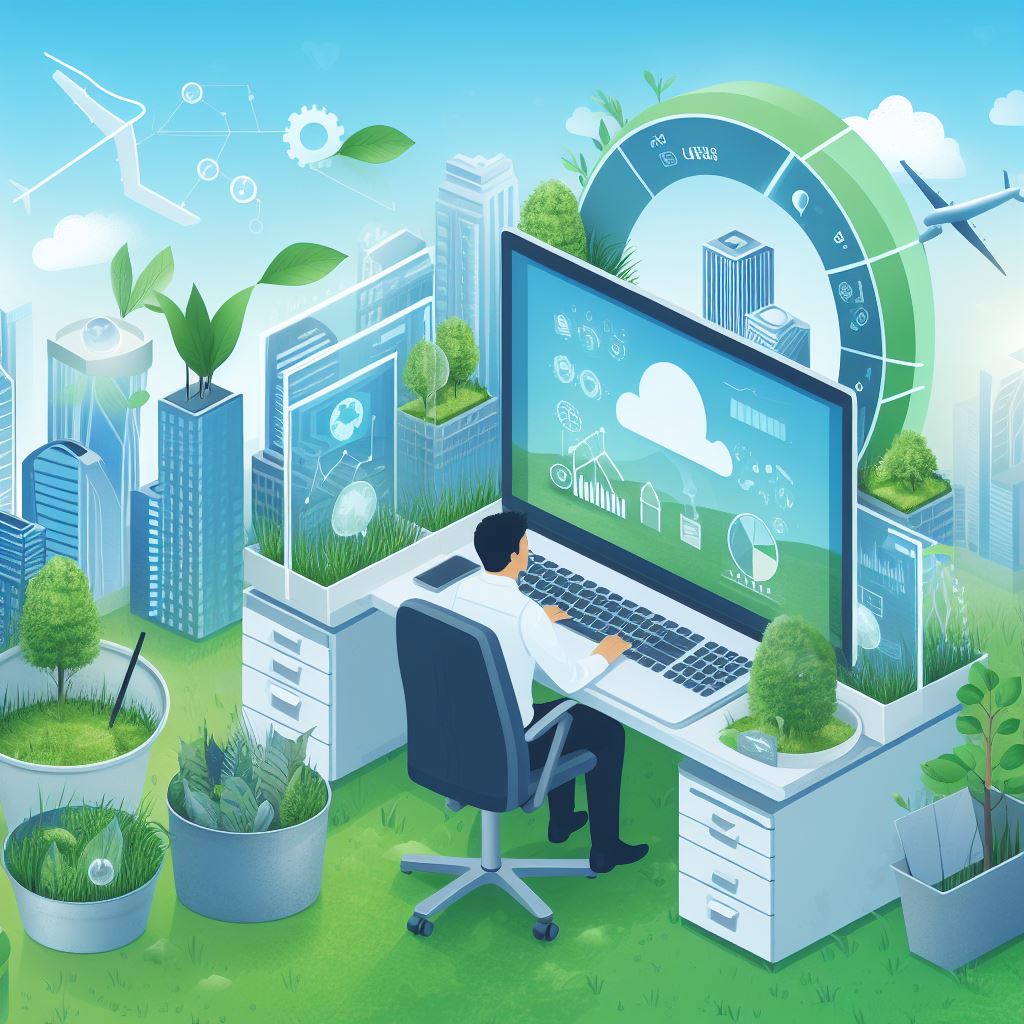
The role of traditional workplaces in our business ecosystem is well established, ranging from towering business edifices to expansive office complexes. Interestingly, in an age abuzz with talk of digital transformation and telework, the environmental toll of typical physical offices often gets overlooked. These offices introduce numerous environmental issues, from heavy daily energy use to travel-related pollution, and from paper waste to e-waste. It is projected that workplace structures alone account for almost 20% of all commercial energy use, signifying the substantial scope of this concern.
The typical energy usage by offices is a leading element exacerbating environmental strain. The thermoregulation and illumination needs of these gigantic edifices and the energy demand of office machines, appliances, and data centers add up to a considerable total. It is even more concerning considering that much of this energy is wasted as these resources are frequently left running overnights or during weekends.
On another account, commuting to these workplaces is another significant pillar of the carbon footprint associated with large offices. Thousands of people commuting to work daily in their personal vehicles dramatically increase greenhouse gas emissions. This aspect contributes to the escalation of environmental challenges tied to traditional office culture.
The paper and electronic waste produced by these offices. Office activities generate enormous amounts of paper, often disposed of irresponsibly, leading to deforestation and landfills. E-waste, on the other hand, is piling up at an alarming rate, with obsolete computers, printers, and other office equipment frequently discarded without proper recycling protocols, posing a threat to our environment.
It’s becoming clear that traditional offices have a notable environmental impact. A transition to more resource-efficient workplaces, improved energy-saving protocols, increased recycling efforts, and a shift to more eco-friendly commuting options are some of the approaches businesses might consider to help mitigate this impact. This not only ensures a healthier environment but also plays a substantial role in overall business sustainability. Thus, an environmentally conscious approach within office culture is imperative in times like these, where the threat of environmental degradation is omnipresent.
Embracing Virtual Offices for Sustainable Work Practices
Virtual offices present a forward-thinking approach to address several environmental concerns tied to traditional office setups. Anchorless by design, these innovative workspaces leverage a centralized network to function, bypassing the need for expansive physical establishments. The minimization of physical space, synonymous with virtual working offices, results in a substantial decrease in overall energy usage and corresponding carbon emissions.
A key aspect of these immersive workspaces doesn’t just stop at energy conservation but extends to waste management. The utilization of virtual offices translates to a significant reduction in paper waste and electronic refuse. By managing and storing all critical information digitally, businesses can decrease dependency on paper which traditionally has been a primary resource in conventional office setups. The diminished need for physical infrastructure also leads to a smaller operational footprint, thus enabling businesses to move to sustainable and eco-friendly practices.
At the core of their design, virtual offices eliminate the requirement for daily employee commutes. This factor is often overlooked but has a profound impact on the environment. As employees can work from their preferred locations, primarily their homes, daily miles traveled are considerably reduced. This shift has a twofold effect – a decrease in fuel consumption along with a corresponding reduction in carbon dioxide emissions, and a decrease in traffic congestion. The collective repercussion is a sizable contribution to a healthier environment with less traffic-induced air pollution.
To augment these environmental benefits, virtual offices also have potential advantages from a social sustainability perspective. Remote work arrangements can improve employee well-being by saving commute time, reducing stress, and offering a better work-life balance.
Virtual offices offer a synthesis of sustainable work practices that have the capacity not only to reduce the environmental impact of business operations but also to transform the way employees balance their professional and personal life. The virtual office model is more than a mere trend; it’s the embodiment of an environmentally conscious, futuristic work culture.
Virtual Offices Facilitating a Reduced Carbon Footprint
With companies redefining their operational framework to suit modern-day clientele, the paradigm is shifting to digitization. This shift has led to innovative work strategies, including a growing emphasis on virtual offices that could significantly diminish the carbon footprint. This approach not only aligns with the global objective of sustainability but also catapults us into a future where business practices endorse environmental conservation.
Global warming poses a grave threat to our planet, necessitating the amalgamation of sustainability and traditional work ethics. Adoption of virtual offices isn’t just sustainability-focused, it also portrays a vision of an eco-friendly future. It presents a scenario where all aspects of professional life are attuned to support the environment.
The impact of our contemporary decisions on the climate can’t be underestimated. We are crafting the blueprint of the future with every stride we make today. In this context, virtual offices offer the potential for a sustainable existence. They have started gaining considerable attention from corporations around the globe.

Transition to virtual offices allows enterprises to contribute towards a sustainable future. The primary objective here is to strike a balance between efficient business practices and environmental conservation, thereby promoting a healthier planet. This is of paramount significance considering the escalating environmental issues that need immediate attention.
Virtual offices have the potential of bringing about a radical decrease in the carbon footprint, thus favorably positioning us to fulfill the UN’s sustainability aspirations. But to bring this vision to fruition, businesses should make a resonating shift by embracing work-from-home models supported by digital tools and technology.
In unison with global warming concerns, integrating environment-friendly practices with work ethics isn’t an option anymore, but rather a compulsion. It is pivotal to imbibe the idea of a virtual workspace not just as a tool for achieving sustainability but an agency for a future where business conduct concords with environmental preservation.
Organizations adopting virtual offices contribute to a viable future. They occupy a unique place where the efficiency of business operations coincides with environmental protection. This effort undoubtedly paves the way towards a healthier, greener planet.